Contemporary Russian émigré literature has long been overlooked by Russian critics and the Russian public, as if this niche of Russian literature had not been of interest since the days of the charismatic Sergei Dovlatov or the famous Nobel laureate Alexander Solzhenitsyn.
When discussing contemporary Russian émigré literature in the United States, it is important to emphasize that the recent wave of Russian émigré writers in the United States is a diverse entity that includes both Russian- and English-language writers. Two distinct trends can be observed, one of which could be defined as part of what is known as Russophone literature-that is, post-Soviet literature written by immigrants to the United States who continue to create literary works in Russian and in the Russian literary pattern. Others, especially those who came to the United States as adolescents, have switched to English, which has become their first language. Have their works become part of the broader American literature? In a sense, they get some recognition. For many young and talented creative writers who found themselves in the United States during the last wave of post-Soviet immigration in the 1990s and early 21st century, the dilemma has been whether to continue writing in Russian and face limited recognition among the Russian-speaking diaspora and a subdued reception in literary circles in the Russian metropolis, or to switch to an adopted language and try to succeed in the new country. The choice has often been English.
For the purpose of literary criticism, both trends can be seen as a continuation of the Russian literary tradition in the West. At the same time, it is obvious that the English-language works of Russian-origin émigré writers are moving further away from mainstream Russian literature in terms of themes and style and are being influenced by modern Western literature. On the other hand, the literary output of post-Soviet Russian émigrés over the past twenty-five years seems to show signs of the disappearance of a distinctive Russian literary identity. If the “first wave” of Russian émigré writers sought to preserve and develop the traditions of original Russian literature based on intense self-consciousness and preoccupation with philosophical issues, the new generation of émigré writers seems to lack the artistic merit of the great novelists and poets who preceded them.
In the midst of absolute freedom of thought and expression in the West, contemporary Russian émigré literature seems to be losing its unique appeal. According to Margarita Meklina, a bilingual Russian-American writer living in California, unlike the prolific, “albeit frightening, ‘white emigration era,’ recent Russophone literature in the West is not flourishing” (Meklina, Margarita. “Letter from Russia.” Context, N.16). Indeed, it is rare to see the works of recent emigrant writers on a par with the great works of earlier generations of Russian literary emigration, such as Nabokov, Bunin, or Gazdanov.
This is not the case with authors who have switched to English in their works. The credit for this goes to one of the most successful Russian-American novelists, NYT bestselling author Gary Shteingart, and perhaps to Olga Grushin, author of the highly praised novel The Dream Life of Sukhanov (2005). Speaking of contemporary Russian-American writers, Columbia University professor and journalist Keith Gessen emphasized that they all “emerged from the mantle of Shteyngart,” who in fact began the “odyssey” of the post-Soviet Russian immigrant’s wandering and survival in modern America. And indeed, the theme of “Russians in America” was brilliantly introduced by Gary Shteyngart. His literary triumph began with The Russian Debutante’s Handbook (2002), which “The Guardian” called one of the best debuts of the year. Its main hero, Vladimir Girshkin, became the prototype for a whole series of characters written in the genre of “black comedy” based on the immigrant experience. Shteyngart’s Absurdistan (2006) continued the theme and was named one of the ten best books of the year. More recently, after exploring the Russian Jewish immigrant experience in America in Lake Success (2018), Shteyngart turned to the theme of American multiculturalism in his award-winning novel Our Country Friends (2021). There, eight friends of different national origins find themselves in the home of a Russian-American writer during the pandemic quarantine.
The aura of the “American immigrant novel” genre is well accepted in the United States, and many emigre writers writing in English have explored this theme. This genre is particularly popular among recent Jewish immigrant women writers. Anya Ulinich and Lara Vapnyar, Sana Krasikov and Ellen Littman, Yelena Akhtiorskaya and Maria Kuznetsova have written excellent books about the lives of Jewish, Ukrainian, Russian and Georgian immigrants in America, based on their own based on their own experiences.
What are the main factors influencing the literary work by Russian-language authors in the U.S.?
Cultural shock, displacement and nostalgia, as well as a new linguistic environment, are factors that many writers say influenced their work at the beginning of their literary careers in the United States. Ellen Litman, who immigrated to the U.S. with her parents while she was in college, says that the presence of her past life had a lasting effect: “So I was always interested in the question: How would my life have turned out if I had stayed? And that parallel, imagined life exists somewhere” (Satchkova, Svetlana. “The immigrant era Seven Soviet-born writers who made it big in the U.S. reflect on their lives,” Meduza, April 24, 202o). In her recent interview to “Long River Review”, Litman reflects: “Everything my life was built on was disappearing. It felt unimaginable to leave. Immigration is really hard on your ego…Your whole sense of self and identity changes. It was incredibly hard on my parents. It felt like everything was breaking apart in various ways. Nothing felt normal.” (An interview with Prof. Ellen Littman, “Long River Review,” May 8, 2021).
There are many factors that influence Russian émigré literature in the U.S. Perhaps one of the most important is the difficulty of reaching a broad Russian audience by writing in Russian in America. Margarita Meklina argues that “there is almost no Russian literary criticism abroad; writers outside of Russia feel that their literature has no meaning and write without hope of seeing their work published” (Meklina, ibid.). Literary success in the Russian metropolis often depends on recognition by literary critics and participation in prestigious literary competitions such as the NOS, Andrey Bely, or the Russian Prize.
It is sometimes difficult for young writers to find a publisher. Local publishers often reject their work on the pretext of lack of commercial interest. For talented but unknown Russian-speaking writers living in the United States, breaking through this “containment wall” is sometimes almost impossible. Often arriving as teenagers with their parents, they struggle to find their identity in a new land. The lack of opportunities and decent jobs for educated Russian immigrants, who have to start from the bottom in order to succeed, is mentioned in almost every “immigrant novel”. In fact, many successful immigrant writers in the United States have told similar stories in their books. Anya Ulinich, in her book Petropolis, wrote a wonderful, funny, and sad story about the adventures of the “Russian bride” Sasha in America, who could be a prototype for many other characters. Vasily Aksyonov, who walked the path of being an émigré writer in the US after being a successful author in Europe, articulated this in a 1992 interview with the LAT: “Whether it is easier to be a writer here (in America) is another question. Again, it’s easier to be a writer if you have a professorship.” Aksyonov lived for twenty years in Washington, D.C., and Virginia, where he taught Russian literature at George Mason University and other colleges, and worked as a journalist for Radio Liberty in Europe. And indeed, a university professorship often paves the way to a literary career very quickly.
However, it would be a mistake to assume that being “uprooted” from one’s homeland results in a loss of creative potential or the ability to write outstanding works in one’s native language. Yuz Aleshkovsky (1929-2022), one of the best contemporary Russian émigré writers, emphasized in his interview with the BBC that Russian literature in America still depends on the mother tongue: “It has become even more treasured because it was with me in my exile, although the linguistic space, the main one, all its music and sound remained there. So, there was a sense of deep kinship mixed with the sense of language. What was obvious to me there (in Russia) was perceived by me here (in the USA)” (BBC, March 22, 2022).
Some Russophone novelists and poets, living in the United States have become popular names in the thriving literary market in Russia today. Among them are the wonderful poets Polina Barskova and Bakhyt Kenzheyev, Anna Glazova, Andrei Ivanov, and the New York-based Russian writer and doctor Alexander Stressin, whose book New York Rounds won the 2019 NOS Prize; as well as Vadim Mesyats with his interesting publishing project “New Gulliver,” and others. Speaking about poetry, Alla Gorbunova, a prominent Russian poet, writer, and critic, emphasized the duality of contemporary Russophone poetry, which can be deeply rooted in the Russian poetic tradition and at the same time completely open to the experience of other cultures and languages (An Interview with Alla Gorbunova, by Alexandra Tkacheva. Punctured Lines, 02/09/2022).
What’s next for Russian émigré authors?
The emergence of several writers of Soviet origin who have achieved both literary and commercial success in the United States confirms that at least some Russian writers living in the United States feel drawn to Anglophone literature. Having successfully mastered the “American immigrant” theme and achieved a certain literary recognition in the United States, they turn to the realities of the new country. Their names are probably little known to readers in Russia, but many of them have achieved a special status as Russian-American writers who have successfully explored the themes of immigration, identity, the previous life, and adventures in the new country. They have very different literary styles, but they are distinctive authors who have already taken their place in American literature and can still be considered part of the Russian cultural tradition. Olga Grushin, in an interview with Alden Mudge, emphasizes the unique situation of Russian-American writers: “I strive for a kind of fusion of Russian and English in my use of language… I think it’s important for me to preserve the Russian cadences and feel in my work. On the other hand, I live here and I’ve been writing in English for 20 years, which has obviously changed me.” And perhaps this is the best answer to the question of the future development of Russian-American literature as a unique part of the great world literature.
06/29/2022
POLINA BARSKOVA
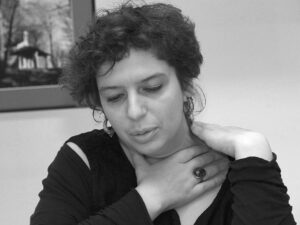
Bio: Polina Barskova was born in Leningrad in 1976, began writing poetry at age eight and published her first book of poetry in 1991. Her poetry has won her recognition as one of the best Russian poets of her generation. Barskova immigrated to the United States at age 20 to pursue graduate studies at the University of California, Berkeley, having already earned a degree in classical literature from St. Petersburg State University. She received her doctorate from the University of California, Berkeley, in 2006. She is currently an assistant professor of Russian literature at Hampshire College. Three books of her poetry have appeared in English translation: This Lamentable City, The Zoo in Winter, and Relocations. Her poignant masterpiece, Living Pictures, about the siege of Leningrad during World War II, was published in Russia in 2019; an English translation was published in 2022.
OLGA GRUSHIN
Bio: Born in Moscow, Olga Grushin spent her early childhood in Prague. After returning to Moscow, she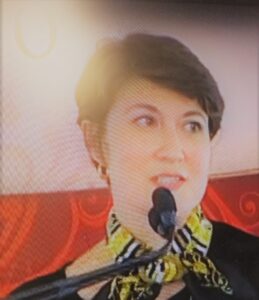 was educated at Pushkin Museum of Fine Arts and Moscow State University before receiving a scholarship to Emory University in 1989. She graduated from Emory in 1993. She became a naturalized US citizen in 2002, but retains Russian citizenship. Since coming to the United States, she has been an interpreter for President Jimmy Carter, a cocktail waitress in a jazz bar, a translator at the World Bank, a research analyst at a Washington law firm, an editor at Harvard University’s Dumbarton Oaks Research Library and Collection. She is the author of three previous novels, Forty Rooms, The Line and The Dream Life of Sukhanov. Her debut novel, The Dream Life of Sukhanov, won the New York Public Library Young Lions Fiction Award, earned her a place on Granta’s once-a-decade Best Young American Novelists list, and was one of The New York Times’ Notable Books of the Year. Both it and The Line were among The Washington Post’s Ten Best Books of the Year. Grushin writes in English, and her work has been translated into sixteen languages. Her latest novel The Charmed Wife was published in 2021. A citizen of Russia and the United States, Grushin lives outside Washington, D.C.
was educated at Pushkin Museum of Fine Arts and Moscow State University before receiving a scholarship to Emory University in 1989. She graduated from Emory in 1993. She became a naturalized US citizen in 2002, but retains Russian citizenship. Since coming to the United States, she has been an interpreter for President Jimmy Carter, a cocktail waitress in a jazz bar, a translator at the World Bank, a research analyst at a Washington law firm, an editor at Harvard University’s Dumbarton Oaks Research Library and Collection. She is the author of three previous novels, Forty Rooms, The Line and The Dream Life of Sukhanov. Her debut novel, The Dream Life of Sukhanov, won the New York Public Library Young Lions Fiction Award, earned her a place on Granta’s once-a-decade Best Young American Novelists list, and was one of The New York Times’ Notable Books of the Year. Both it and The Line were among The Washington Post’s Ten Best Books of the Year. Grushin writes in English, and her work has been translated into sixteen languages. Her latest novel The Charmed Wife was published in 2021. A citizen of Russia and the United States, Grushin lives outside Washington, D.C.
OLGA ISAEVA
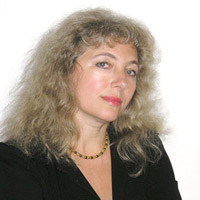 Bio: Olga Isaeva is a writer, journalist, laureate of the Russian America contest, and participant of the Moscow Poetry Biennale 2007. She was born in Kazakhstan in 1958 and graduated from the Krupskaya Moscow Pedagogical Institute. Before immigrating to the USA, Isaeva worked as a high school teacher. Since 1988, she has lived in New York. She has published her work in the Russian and émigré magazines Novy Zhurnal, Time and Us, Word, Interpoeziya, New Youth.
Bio: Olga Isaeva is a writer, journalist, laureate of the Russian America contest, and participant of the Moscow Poetry Biennale 2007. She was born in Kazakhstan in 1958 and graduated from the Krupskaya Moscow Pedagogical Institute. Before immigrating to the USA, Isaeva worked as a high school teacher. Since 1988, she has lived in New York. She has published her work in the Russian and émigré magazines Novy Zhurnal, Time and Us, Word, Interpoeziya, New Youth.
SANA KRASIKOV
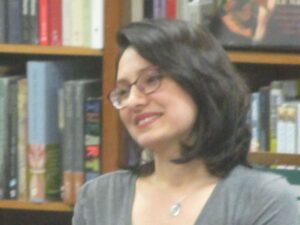
Bio: Sana Krasikov is a Russian-American writer. She was born in Ukraine and grew up in the Republic of Georgia as well as in the United States. She graduated from Cornell University in 2001. Krasikov’s debut short story collection, Another Year, published in 2008, gained critical acclaim for its exploration of the lives of Russian and Georgian immigrants in the United States. In 2017, Krasikov published The Patriots, a novel that explores the complicated relationship between Russia and America through the life story of three generations of American family moving back and forth between America and Russia. The novel’s protagonist, Florence Fine, returned from Brooklyn to Moscow during the Great Depression. In 2017, Krasikov was named one of the best young American writers by Granta magazine.
IRINA MURAVYOVA
 Bio: Irina Muravyova was born in 1952 in Moscow. She immigrated to the United States in 1985 and currently lives in Boston. Muravyova has several books of prose to her credit. Her novel The Angel’s Day covers history of three generations of Russian émigrés, her Young Lady is a finalist for the Bunin Prize. Muravyova’s novel, Beatrice’s Reflection (2012) examines Dante’s life through his love at first sight for Beatrice.
Bio: Irina Muravyova was born in 1952 in Moscow. She immigrated to the United States in 1985 and currently lives in Boston. Muravyova has several books of prose to her credit. Her novel The Angel’s Day covers history of three generations of Russian émigrés, her Young Lady is a finalist for the Bunin Prize. Muravyova’s novel, Beatrice’s Reflection (2012) examines Dante’s life through his love at first sight for Beatrice.
Helga Landauer (Helga Olshvang)
Bio: Helga Landauer (Olshvang) was born in Moscow, Russia, where she graduated from Russian State Institute of Cinematography (VGIK), received her Bachelor’s and Master of Fine Arts degree and worked on Russian National Television, writing and directing programs for broadcast. Her poems have been published in major Russian magazines and anthologies. Since 1996, she lives in the United States. Helga works as a writer and filmmaker. Her documentaries Being Far from Venice (1998), Objects in Mirror are Closer than They Appear (2002), A Journey of Dmitry Shostakovich (2006, co-directed with Oksana Dvornichenko), A Film About Anna Akhmatova (2008), and Diversions (2009) have been screened at many international film festivals and significant American and European venues such as Carnegie Hall, Queen Elizabeth Hall and the Louvre Auditorium.
Kseniya Melnik

Bio: Kseniya Melnik was born in Magadan in the northeast of Russia and immigrated to Alaska in 1998, at the age of fifteen. Melnik’s birthplace in one of the harshest and most exotic places in the Russian Far East, Magadan, as well as her immigration to Alaska, set her apart from other former Soviet immigrants who mostly settled in New York or California. She received her Master of Fine Arts from New York University, her work has been published in Brooklyn Rail, Epoch, Prospect, Virginia Quarterly Review, and was selected for Granta’s New Voices series. Her wonderful debut book of short stories Snow in May (2016) tells about ordinary Russian people from Kolyma and Magadan.
Gary Shteyngart

Bio: Gary Shteyngart is the New York Times bestselling author of the memoir Little Failure and the novels Super Sad True Love Story, Absurdistan, Lake Success. He was born in 1972 in Leningrad. He was only seven years old when his family immigrated to America from the Soviet Union. His debut novel, The Russian Debutante’s Handbook (2002), written in the genre of black comedy, had a great success with readers. His new novel, Our Country Friends, was published in 2021. Steingart is one of the few contemporary writers of Russian descent to gain fame in the West. He writes in English.
Maxim Shrayer

Bio: Maxim Shrayer, an author, scholar and translator, is a professor of Russian, English, and Jewish Studies at Boston College. Born in 1967 to a writer’s family, Shrayer grew up in Moscow and immigrated to the United States in 1987. Shrayer attended Moscow University, Brown University, Rutgers University and Yale. Since 1996, he has been teaching at Boston College. Among his books is autobiographic Waiting for America (2007).
Lara Vapnyar
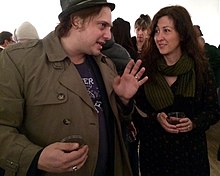
Wikidata
Bio: Lara Vapnyar is a Russian-American author currently living in the United States. She was born in Moscow in 1975 and earned a degree in Russian Language and Literature from Moscow University. In 1998 she immigrated to the United States. Vapnyar recalled that her first experience in the new country was “a feeling of loneliness and alienation”. Vapnyar began to write stories in English and her first work was published in 2002. In 2011, Vapnyar received a Guggenheim Fellowship and is currently working as a professor of creative writing at Columbia University. Vapnyar has published several novels and two collections of short stories. Similar to other relatively young Russian-American authors, who immigrated to the United States in 90s, Vapnyar is writing exclusively in English but considers herself a “transcultural writer”. Her work has also appeared in The New Yorker, Harper’s Magazine, and others.
Selected Bibliography Compiled by Bud Woodward
Bezmozgis, David. The Free World. New York: Farrar, Straus and Giroux, 2011.
Bezmozgis, David. Natasha and Other Stories. New York: Farrar, Straus and Giroux, 2004.
Budman, Mark. My Life at First Try: A Novel. Berkeley: Counterpoint, 2008
Gorokhova, Elena. A Mountain of Crumbs: A Memoir. New York, NY: Simon & Schuster, 2010.
Grushin, Olga. The Dream Life of Sukhanov. New York: G.P. Putnam’s Sons, 2005.
Grushin, Olga. The Line. New York: G.P. Putnam’s Sons, 2010.
Grushin, Olga. Forty Rooms, New York: Marian Wood Books/Putnam’s
Kaminer, Wladimir. Russian Disco: Tales of Everyday Lunacy on the Streets of Berlin. London: Ebury, 2002.
Kaminsky, Ilya. Dancing in Odessa. Dorset, Vt: Tupelo Press, 2004. Print.
Krasikov, Sana. One More Year: Stories. New York: Spiegel & Grau, 2008.
Litman, Ellen. The Last Chicken in America: A Novel in Stories. New York: W.W. Norton, 2007.
Makine, Andreï, and Geoffrey Strachan. Music of a Life: A Novel. New York: Arcade Pub, 2002.
Makine, Andreï, and Geoffrey Strachan. Confessions of a Fallen Standard-Bearer. New York: Arcade Pub, 2000.
Makine, Andreï, and Geoffrey Strachan. Human Love: A Novel. New York: Arcade Pub, 2008.
Makine, Andreï. Le Testament Français: Roman. Paris: Mercure de France, 1995.
Makine, Andreï, and Geoffrey Strachan. Once Upon the River Love. New York: Arcade Pub, 1998.
Makine, Andrei. Requiem for the East. London: Sceptre, 2001.
Makine, Andreï, and Geoffrey Strachan. The Earth and Sky of Jacques Dorme: A Novel. New York: Arcade Publishing, 2005.
Makine, Andreï, and Geoffrey Strachan. Requiem for a Lost Empire. New York: Arcade Pub, 2001.
Makine, Andreï, and Geoffrey Strachan. Dreams of My Russian Summers. New York: Arcade Pub, 1997.
Makine, Andreï. The Life of an Unknown Man. London: Sceptre, 2010.
Makine, Andreï, and Geoffrey Strachan. The Crime of Olga Arbyelina. New York: Arcade Pub, 1999.
Makine, Andreï, and Geoffrey Strachan. The Woman Who Waited: A Novel. New York: Arcade Pub, 2006.
Reyn, Irina. What Happened to Anna K: A Novel. New York: Simon & Schuster, 2008.
Shrayer, Maxim. With or Without You: The Prospect for Jews in Today’s Russia. Boston: Academic Studies Press, 2017.
Shrayer, Maxim. Leaving Russia: A Jewish Story. Syracuse: Syracuse University Press, 2013.
Shrayer, Maxim. Yom Kippur in Amsterdam: Stories. Syracuse: Syracuse University Press, 2009.
Shteyngart, Gary. Absurdistan. New York: Random House, 2006.
Shteyngart, Gary. The Russian Debutante’s Handbook. New York: Riverhead Books, 2002.
Shteyngart, Gary. Super Sad True Love Story: A Novel. New York: Random House, 2010.
Shteyngart, Gary. Lake Success. New York: Random House, 2018.
Vapnyar, Lara. Broccoli and Other Tales of Food and Love. New York: Pantheon Books, 2008.
Vapnyar, Lara. Memoirs of a Muse. New York: Pantheon Books, 2006.
Vapnyar, Lara. There Are Jews in My House. New York: Pantheon Books, 2003.
Vapnyar, Lara. Divide Me By Zero: A Novel. New York: Tin House Books, 2019
Vapnyar, Lara. Still Here: A Novel. Hogarth, 2016.
9/9/11
